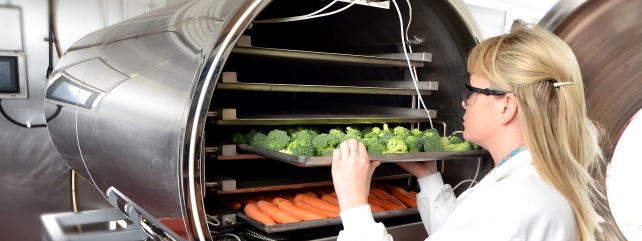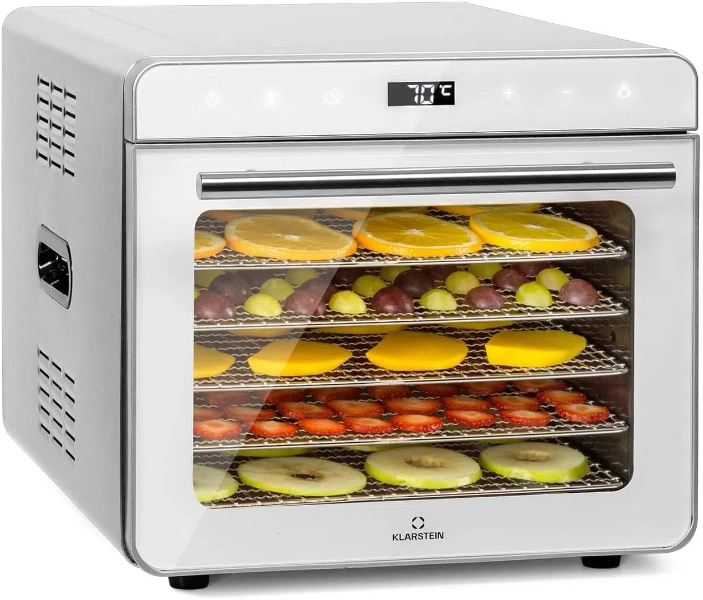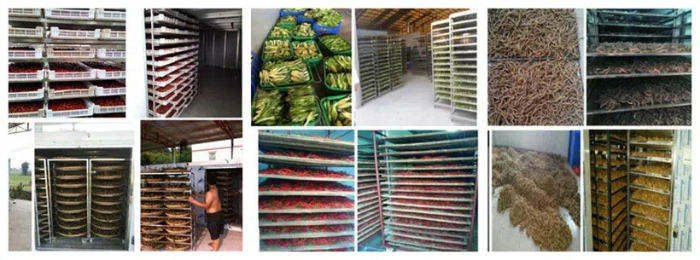
Content Menu
● Introduction
● Understanding Food Drying Technologies
>> What is a Condenser Dryer?
>> What is a Heat Pump Dryer?
● Performance Comparison: Condenser Dryer vs Heat Pump Dryer
>> 1. Energy Efficiency
>> 2. Drying Temperature Control
>> 3. Drying Time
>> 4. Maintenance and Longevity
>> 5. Cost Considerations
● Applications of Food Drying Machines
>> 1. Fruit Drying
>> 2. Vegetable Drying
>> 3. Meat Drying
>> 4. Seafood Drying
>> 5. Herbal Drying
● Advantages of Using Heat Pump Dryers in Food Processing
● Challenges in Food Drying Technology
>> 1. Initial Investment Costs
>> 2. Space Requirements
>> 3. Complexity of Operation
● Future Trends in Food Drying Technology
>> 1. Automation
>> 2. Smart Technology Integration
>> 3. Sustainable Practices
● Conclusion
● Frequently Asked Questions (FAQs)
>> 1: What Are the Main Differences Between Condenser Dryers and Heat Pump Dryers?
>> 2: Which Type of Dryer Is Better for Fruits?
>> 3: Can I Use a Condenser Dryer for Meat Products?
>> 4: How Do Energy Costs Compare Between These Two Types of Dryers?
>> 5: What Maintenance Is Required for Each Type of Dryer?
Introduction
In the world of food processing, drying is a crucial step that affects the quality, shelf life, and flavor of products. As a leading manufacturer of food drying machines in China, we offer OEM services to international brands, wholesalers, and manufacturers. This article explores the differences between two popular types of drying technologies: condenser dryers and heat pump dryers, focusing on their performance in food drying applications.

Understanding Food Drying Technologies
What is a Condenser Dryer?
A condenser dryer operates by removing moisture from food products using hot air. The moisture-laden air is then cooled, causing the water vapor to condense into water, which is collected in a tank. This method is widely used for various food items, including fruits, vegetables, and meats. The process typically involves heating the air to a set temperature before circulating it through the food product. As the air absorbs moisture, it becomes saturated and is then cooled down to condense the moisture out.
What is a Heat Pump Dryer?
In contrast, a heat pump dryer uses a refrigeration cycle to dry food. It extracts moisture from the product and recycles heat within the system, making it more energy-efficient compared to traditional drying methods. This technology is particularly beneficial for sensitive foods that require lower drying temperatures. Heat pump dryers can maintain consistent temperatures and humidity levels throughout the drying process, which is essential for preserving the quality of delicate items.
Performance Comparison: Condenser Dryer vs Heat Pump Dryer
1. Energy Efficiency
One of the most significant advantages of heat pump dryers is their energy efficiency. They can operate at lower temperatures while still achieving effective moisture removal. This efficiency translates into lower energy costs over time when compared to condenser dryers. For businesses looking to reduce operational costs, this feature makes heat pump dryers an attractive option.
2. Drying Temperature Control
Heat pump dryers allow for precise temperature control, which is essential for drying delicate foods without compromising their quality. In contrast, condenser dryers may operate at higher temperatures that could damage sensitive products. For example, when drying herbs or certain fruits, maintaining a lower temperature can prevent loss of flavor and nutrients.
3. Drying Time
While condenser dryers may have a faster initial drying time due to higher temperatures, heat pump dryers compensate with their efficiency and ability to maintain optimal conditions for longer periods. This results in better quality dried products. The slower drying process in heat pump dryers allows for more uniform moisture removal, reducing the risk of over-drying or under-drying specific areas.
4. Maintenance and Longevity
Heat pump dryers generally require less maintenance due to their closed-loop system and efficient operation. Conversely, condenser dryers may need more frequent maintenance due to the accumulation of water and potential issues with the condensation tank. Regular cleaning and maintenance are essential for condenser dryers to ensure optimal performance and prevent malfunctions.
5. Cost Considerations
While heat pump dryers have a higher upfront cost, their long-term savings on energy bills and lower maintenance costs can make them more economical over time compared to condenser dryers. Businesses should consider both initial investment and ongoing operational costs when choosing between these two technologies.

Applications of Food Drying Machines
1. Fruit Drying
Both condenser and heat pump dryers are suitable for fruit drying applications. However, heat pump dryers are preferred for high-value fruits like apples and berries due to their gentle drying process that preserves flavor and nutrients. For instance, when drying apples for snacks or baking purposes, maintaining the natural sweetness and texture is vital; heat pump technology excels in this aspect.
2. Vegetable Drying
Vegetables such as carrots and peppers can be dried effectively using both technologies. Heat pump dryers offer better color retention and nutritional preservation because they dry at lower temperatures without compromising quality. This is particularly important for vegetables that are often used in soups or stews where color and flavor are critical.
3. Meat Drying
For meat products like jerky, both types of dryers can be utilized effectively. However, heat pump dryers provide better control over temperature and humidity levels, resulting in superior quality dried meat. The ability to maintain specific conditions helps prevent spoilage while enhancing flavor profiles.
4. Seafood Drying
Seafood requires careful handling during the drying process to avoid spoilage. Heat pump dryers excel in this area by maintaining optimal conditions throughout the drying cycle. This technology helps preserve the delicate flavors of fish while ensuring safe moisture removal.
5. Herbal Drying
Herbs are another category where heat pump dryers shine due to their ability to dry at low temperatures without losing essential oils or flavors. This makes them ideal for producing high-quality dried herbs used in culinary applications.
Advantages of Using Heat Pump Dryers in Food Processing
1. Energy Efficiency: Reduced energy consumption leads to lower operational costs.
2. Quality Preservation: Maintains flavor, color, and nutritional value of food products.
3. Versatility: Suitable for a wide range of food items.
4. Environmentally Friendly: Lower carbon footprint compared to traditional drying methods.
5. Consistent Results: Provides uniform drying results across all batches.
Challenges in Food Drying Technology
While both condenser and heat pump dryers offer unique advantages, they also face challenges:
1. Initial Investment Costs
Heat pump dryers typically require a higher initial investment compared to condenser models due to their advanced technology and components.
2. Space Requirements
Heat pump systems may require more space for installation compared to traditional condenser units because they often include additional components like compressors and evaporators.
3. Complexity of Operation
The advanced technology used in heat pump dryers may necessitate specialized training for operators to ensure optimal performance and maintenance practices.
Future Trends in Food Drying Technology
As technology continues to evolve, several trends are emerging in the food drying industry:
1. Automation
Incorporating automation into drying processes can enhance efficiency and reduce labor costs while ensuring consistent product quality.
2. Smart Technology Integration
Integrating smart technology allows operators to monitor performance remotely and make real-time adjustments based on specific requirements.
3. Sustainable Practices
With increasing awareness about environmental sustainability, manufacturers are focusing on developing more eco-friendly drying solutions that reduce energy consumption and waste.
Conclusion
When considering the choice between a condenser dryer and a heat pump dryer, it's essential to evaluate your specific needs in food processing. While condenser dryers may offer quicker drying times at higher temperatures, heat pump dryers provide superior energy efficiency, quality preservation, versatility for various food items, and long-term cost savings.In conclusion, if you are looking for an efficient solution that maintains product integrity while being cost-effective over time, investing in a heat pump dryer could be the best choice for your food processing operations.

Frequently Asked Questions (FAQs)
1: What Are the Main Differences Between Condenser Dryers and Heat Pump Dryers?
Both types of dryers differ primarily in energy efficiency, drying temperature control, maintenance requirements, and overall cost-effectiveness.
2: Which Type of Dryer Is Better for Fruits?
Heat pump dryers are generally better for fruits as they preserve flavor and nutrients better than condenser dryers.
3: Can I Use a Condenser Dryer for Meat Products?
Yes, condenser dryers can be used for meat products; however, heat pump dryers provide better control over temperature and humidity.
4: How Do Energy Costs Compare Between These Two Types of Dryers?
Heat pump dryers typically have lower energy costs due to their efficient operation compared to condenser dryers.
5: What Maintenance Is Required for Each Type of Dryer?
Condenser dryers require more frequent maintenance due to water accumulation issues, while heat pump dryers generally have lower maintenance needs due to their closed-loop system.












